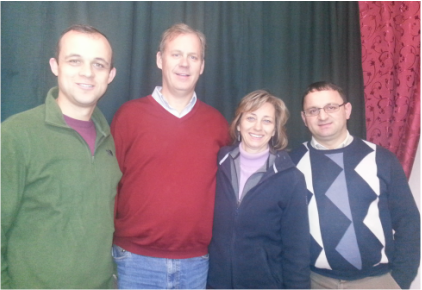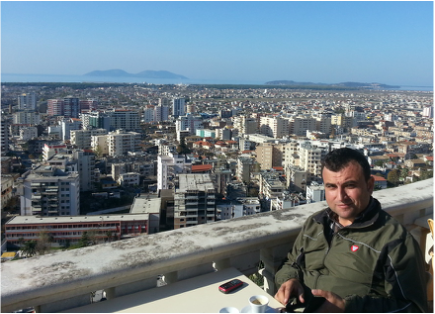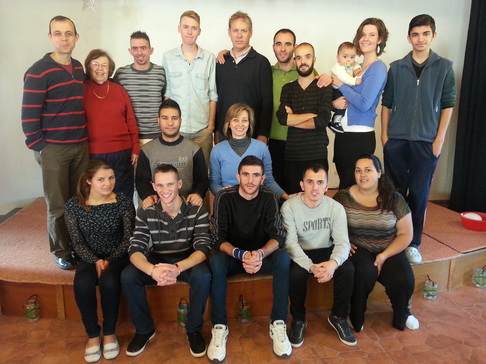 To be honest, we joined Paraclete Mission Group as Mission Associates this year mainly because it was relatively easy. While we respect the thorough vetting and training processes of many other mission agencies, we loved that Paraclete, on the strength of personal recommendations, was willing to take us on, funnel our giving, and back us up without a cumbersome, time- consuming process. We didn’t give a lot of thought to the name or the mission statement—we liked it well enough but didn’t ponder it in depth. But its brevity allows it to pack a punch, and it has haunted me the past few weeks, in particular a vexing preposition that I’m finding harder to pull off than I would like to admit. The mission statement reads, “To glorify God by coming alongside the global missions community to enhance Kingdom effectiveness.” I love that, and I’m most drawn to that sixth word. Alongside is a preposition that flows from their understanding of the work of the Holy Spirit in our lives. Paraclete, as many of you know, refers to the Greek designation for the Holy Spirit, particularly in John 16:7, as the one who comes alongside as our Comforter and Advocate. Alongside is defined as, “Close to the side of, next to, together and in cooperation with.” We met some very impressive missionaries in Albania, Doni and Gail Lilo, who work with Alongside Ministries. They seemed to us to embody the spirit of coming alongside as they humbly used their many gifts to serve their town and their church. I don’t think alongside comes naturally to us as North Americans. I can think of two prepositional tactics I’m better at, and I’ve reverted to both modes a good bit in the last few months:
Alongside—it’s a good word for Advent, isn’t it? Christ went to great lengths to be able to come alongside God’s people. May you sense the Spirit of the Risen Christ coming alongside you in this joyful season.
1 Comment
 Together with Doni and Asim, our translators at the Bible School in Albania, who are themselves excellent teachers and were our partners in our ministry Together with Doni and Asim, our translators at the Bible School in Albania, who are themselves excellent teachers and were our partners in our ministry Whose crazy idea was it to attempt to teach a public speaking course in a language the instructor doesn’t speak, to students with a range of educational levels from college down to the equivalent of eighth grade? Ah yes, that would be me (Lisa). When we first heard of the Udhekryq Torchbearers School in Erseke, Albania, it was clear what Rich could bring. It is primarily a Bible School for young adults (here’s an introduction to the Torchbearers network of schools around the globe), and Rich offered to take them through the book of Ephesians. I could have prepared another book of the Bible, but was eager to see if my training in communication could be of use, and curious how it would transfer cross-culturally. I crafted a set of assignments and simple lectures to empower them to do each one. First, I asked them to make an announcement for a church service, using good motivational strategies, an element of personal testimony, and a winsome invitation. I then asked them to share their testimony in a longer speech. The third assignment was to teach one aspect of doctrine, a line from the Nicene Creed. We took a break from the seriousness and practiced impromptu speaking by selling each other random strange items, recast as different items. We are wrapping up tomorrow with the task of retelling a story from Scripture from a creative angle. As some of the talks have ended, I have asked my students, “Was that easier than you thought it would be, or harder?” As the time ends, I find myself asking that, with surprising answers. Teaching here has been easier than I’d imagined in some ways, and harder in others: Easier: It was easier than I’d imagined getting them to stretch themselves with some assignments that were really new for them. They were quite game and willing to take risks. Hard: Overcoming the translation challenges was trickier than I’d anticipated. When a translator translated the speeches, the students had a hard time with the interruption. Rich and I are used to it but speakers not used to translation tend to look at the translator too much, wait too long, and lose steam in the gaps. For one speech, the translator stood with them and interrupted throughout. For the next one he sat and whispered loudly to the four English speakers, which proved too distracting to the speakers. For another, he gave a summary at the end of each speech. It was never perfect, but we made it work. Harder: Students in Albania tend to be taught via rote memorization and regurgitation of content, and so meta-level thinking such as evaluating the logical flow or creativity level of a peer’s speech was new to them. Evaluation mostly consisted of stating the content they most liked from each other’s speeches. The requirement to sell each other an object as something different than the object itself was for the most part ignored—they enthusiastically sold the items as they were. Changing an item’s identity required a type of lateral thinking which they are not accustomed to doing. Hardest: The toughest part of this week for me emotionally has taken place during the testimony speeches and around the edges, at mealtimes and on walks. One young man, in his testimony speech, told of being beaten regularly by his brother, a Muslim, as punishment for converting to Christianity. He is heading home for Christmas praying for a good attitude to endure the beatings. One young woman is heartbroken knowing that her parents only allowed her to come for the fall, and she may not be able to return after Christmas to a place that has been so life-giving for her. I took a long walk with a former student who is dealing with the deaths of both parents and the years of neglect and abuse from them while they were alive. “I should have aborted you like my doctor told me to!” was her mother’s constant refrain. It was perhaps most poignant for us to observe a man in his thirties coming to class each morning, diligently taking notes on the teaching but clearly not a student, and to learn that he is a graduate who recently lost his job in town and has no prospects whatsoever. Rampant unemployment is one of the most painful themes of Eastern Europe and Eurasia. From Bishkek to Bulgaria, we hear the laments: our best and brightest young people are leaving, Communism left us unprepared to compete in a global economy, government corruption saps jobs, etc. We see the frustration in people’s eyes, and hear the shame and desperation in their voices as they tell the stories of career aspirations crushed, of training for jobs that don’t materialize, of getting then losing a job, etc. We both know some of their pain as we’ve struggled in this area ourselves the last few years. We wish so much that we could wave a wand and fix it, but all we can do is listen, support, pray, and hope alongside people.
We leave Albania with profound respect for the missionaries and nationals who are pouring themselves out to seek the welfare of this land. We met gifted nurses, teachers, and pastors. We leave sobered by the task that lies ahead for the church, entrepreneurs, and the government to build cultures and systems that will enable people to flourish. And we leave thankful for a chance to invest in a few of those people.  Enjoying coffee with Ylli, our host in Vlore, Albania and pastor of the local Baptist church, in an outlook over the town Enjoying coffee with Ylli, our host in Vlore, Albania and pastor of the local Baptist church, in an outlook over the town (See the previous post for Lisa's discussion of leadership handoffs.) Our blog title, One Hundred Homes, derives from the passage in Mark 10 where Jesus says to Peter that anyone who leaves parents and children, family members and homes, for his sake will receive one hundredfold family members and homes (with persecutions) and eternal life in addition. So far, in our more than four months of being on the road, we have stayed in 32 "homes." With about 2/3 of our time remaining, it is quite possible we will hit 100 homes during our year. The biggest dislocation, of course, comes when we change countries, usually by flying from one country to another. We go through passport control, pick up our luggage, and then exit into the receiving area hopefully to be greeted with someone who knows us by sight or who has a sign with our names on it. We don't have working cell phones--they can send and receive texts, but not calls, and only sometimes do we have access to the internet when we come into the receiving area. We feel a little like we are on a trapeze, and having let go of one swing, wonder if there will be someone on the other end who will grab us to bring us to safety. But after over a dozen new country entries, often to places we've never been and visiting people who only know us through the recommendation of a mutual friend, we've never missed a connection. We experience this as a "traveling mercy", and are never unaware of how badly things could go wrong, and grateful that they don't. We are also frequently shuttling from one place to another even within a country. Sometimes, that exchange is quite easy, as when we drive with our country hosts from their home to the location of the conference facility where we will be staying while teaching for the weekend conference or retreat. We have done this in Bosnia, Bulgaria, Romania (more than once), and Georgia. For just two of our country visits have we stayed in one location for the duration of our visit (Belarus and Armenia). We are in Albania now, at our second location, where we will stay for a couple weeks, teaching at a Bible School. (I'm teaching manuscript Bible Study in Ephesians; Lisa is teaching public speaking.) But the school is in Erseka, a rather small town in Southern Albania, and it involved several types of transportation to get us here. Our host in Vlore, Ylli ("Oolie"), walked with us about 25 minutes helping us to roll our luggage to the Minivan pickup place in Vlore, and helped us board a minivan which took us to Tirana, a 2-3 hour journey. Ylli also arranged for a Taxi driver friend of his, in Tirana, to meet us where the minivan ended up, and this guy recognized us the second we alighted from the van. (I asked Ylli how he would know and he just said, "Oh, he will know its you." Apparently, people in this part of the world can, somehow, recognize Americans instantly.) Then, our new taxi-driver host took us to the Stephen Center, a missionary-founded cafe that seemed to be crowded on that Saturday morning with Christian workers from all over. Safely there, we met up with another new Albanian friend, Zef, the leader of the IFES work in Albania, and his family. Zef shared his story with us over breakfast and then took us by car to another part of the city where the minivans that take you to Erseka and other points south leave from. Zef spoke to the driver of the van and assured us that he knew the camp/school and would take us right to the gate of the camp. This trip was about 5 hours long, of which the last 2.5 hours was on the windiest and bumpiest stretch of road I've ever been on, at least for that long. While the van was never full, by the time we were supposed to be close, we were the only ones left in the van. I couldn't ask the driver how long it would be, but he assured me that the camp was still ahead in language that I could kind of make out. (The camp/school was referred to, by everyone, as "Kampi".) When we finally arrived at our destination, 13 hours after we left our "home" in Vlore, we were relieved to meet up with yet more people we had never met but who had expected and prepared for our coming. Soon after that, we were able to email both Ylli and Zef and inform them that all the logistics of the day had gone as planned without a hitch. And while this was a bit of an exceptional travel day, it was just like every other travel day we've had for the last few months--full of small reminders of God's care for us in this unfamiliar part of the world, largely (though not exclusively) through brothers and sisters we had never met. |
Archives
April 2024
AuthorRich and Lisa Lamb Categories |

 RSS Feed
RSS Feed